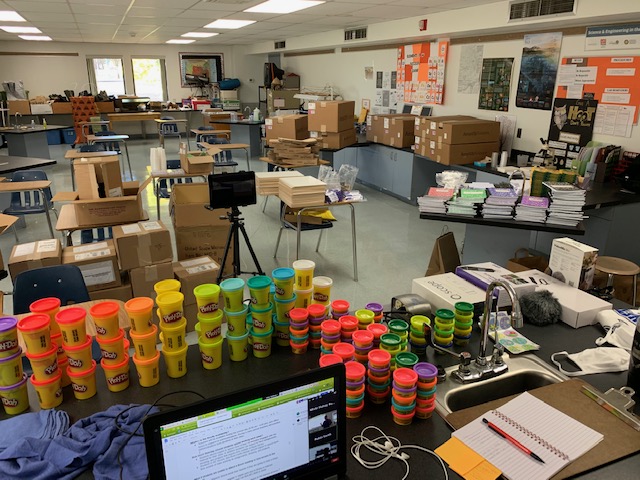News and Announcements
Blog
Take-Home Science Kits
Diack Ecology Grant Allows for Exploration at Home
Blanchet science teacher Dr. Micki Halsey Randall knew that she needed to find a creative solution for keeping students engaged in the midst of digital learning. With all the screen time required in a distance learning environment, she wanted to give her students a breath of fresh air--literally!
“When we decided to go back digitally, I thought, ‘Oh my gosh, how do I get kids engaged outside, because I don’t want them staring at a screen the whole time?’” Dr. HR explained. “Even the idea of them coming back but being socially distanced--how do we do microscope work if they can’t share a microscope?”
The solution? Take-home science kits with portable equipment to help students  conduct observations in their own backyards. Dr. HR turned to Mike Weddle at Diack Ecology for help funding the large undertaking. The Diack Ecology Education Program provides grants and resources for teachers and students in Oregon to encourage field-based science and ecology studies. Through her work with the Outdoor Learning Environment, Dr. HR had already received several grants from the nonprofit.
conduct observations in their own backyards. Dr. HR turned to Mike Weddle at Diack Ecology for help funding the large undertaking. The Diack Ecology Education Program provides grants and resources for teachers and students in Oregon to encourage field-based science and ecology studies. Through her work with the Outdoor Learning Environment, Dr. HR had already received several grants from the nonprofit.
“This is a company that loves to get kids outside,” she said. “With my Outdoor Learning Environment, it was this natural marriage between what I needed and who they wanted to give money to.”
The take-home kits were delivered to all of Dr. HR’s eighth graders in Integrated Science 8 and freshmen/sophomores in Biology--about 100 students in total. Mid high students received handheld lenses to identify specimens of rocks, soils, insects, and plants. As a class, they will be creating a map of their locations and comparing/contrasting the items discovered in their backyards.
 High school Biology students received handheld microscopes instead of lenses, which they are using to explore habitat characteristics, looking closely at insects and plants. The information they gather will be used to design a plan for improving the habitat of the OLE once on-campus learning resumes. All kits included a journal, colored pencils, whiteboard, and markers.
High school Biology students received handheld microscopes instead of lenses, which they are using to explore habitat characteristics, looking closely at insects and plants. The information they gather will be used to design a plan for improving the habitat of the OLE once on-campus learning resumes. All kits included a journal, colored pencils, whiteboard, and markers.
“I’m a big fan of whiteboards,” Dr. HR said. “There’s new research that says kids are more likely to engage on a whiteboard than they are on pencil/paper because it’s so easy to erase if they make a mistake. There’s no permanent record, so they’re more willing to take those risks to try to answer things and brainstorm.”
We’re proud to have a dedicated, creative teacher like Dr. HR as part of our Blanchet family, and look forward to seeing all the wonderful observations and discoveries that stem from our students’ outdoor learning experiences!

What a wonderful thing you are doing for your students. They are very lucky to have you as their teacher!
So glad we have such dedicated and creative teachers for our grandchildren. Keep up the good work.